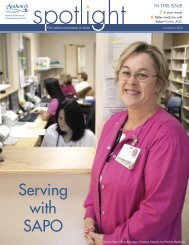Download Cancer Care Center Annual Report - St. Anthony's ...
Download Cancer Care Center Annual Report - St. Anthony's ...
Download Cancer Care Center Annual Report - St. Anthony's ...
- No tags were found...
Create successful ePaper yourself
Turn your PDF publications into a flip-book with our unique Google optimized e-Paper software.
A message from leadershipThe <strong>St</strong>. Anthony’s Colorectal <strong>Cancer</strong> <strong>Care</strong> Team is comprised ofa group of premier oncologic specialists with research-based expertisein colorectal cancer. Colorectal cancer is the second most commoncause of death from cancer in the U.S. today. Cure rates are increasingyearly with improvements in treatment, but more Americans need tohave their colonoscopies performed on a regular basis to exert a biggerimpact on this disease.90 percent of colon cancers occur after the age of 50. Most of thesecancers evolve from benign polyps, which grow into benign adenomas(or gland tumors). Over time (usually 10 years or so), both raised andflat adenomas can turn into cancer. Early detection and removal ofthese pre-malignant tumors can prevent colon cancer and save manylives.Risk factors for colorectal cancers include smoking, eating redmeat, refined grains and sugar, plus alcohol and obesity. Avoidanceof these lifestyle choices, plus the intake of Vitamin D, folate, andVitamin B6 and aspirin can help prevent this cancer from occurring.The genetic risk for colorectal cancer is relatively low. However,persons with a family history of this disease should inform theirprimary care physician. If a colon cancer is diagnosed by colonoscopy,surgical resection is usually performed first. Surgery includes completeremoval of the involved colon segment along with the local bloodsupply and lymph nodes. Laparoscopic (minor fiberoptic) surgery forcolon cancer is frequently performed at <strong>St</strong>. Anthony’s Medical <strong>Center</strong>.Compared to open abdominal surgery, laparoscopic surgery is just aseffective and often provides a shorter hospital stay with less pain andsimilar cure rates. Laparoscopic procedures at <strong>St</strong>. Anthony’s can beperformed with the da Vinci® Surgical System.Colorectal cancer patients at <strong>St</strong>. Anthony’s are usually seen by amulti-disciplinary care team including specialists in surgical, medical,and radiation oncology. X-rays, scans, pathology and other data areoften reviewed and evaluated at a colorectal cancer conference, wherea “personalized treatment plan” is created by consensus. National<strong>Cancer</strong> Institute clinical trials are sometimes available for therapyin qualifying cases. Early colorectal cancer at <strong>St</strong>. Anthony’s canoften be managed with the Oncotype DX Colon <strong>Cancer</strong> (Gene)Assay, which can help predict the value of adjuvant (or preventive)chemotherapy after surgery. The K-RAS gene mutation study can alsobe exceptionally useful in colon cancer cases with advanced disease todetermine treatment eligibility for cetuximab, a monoclonal antibodyand EGFR inhibitor.Treatment for colorectal cancer at <strong>St</strong>. Anthony’s is designedby stage, according to National Comprehensive <strong>Cancer</strong> Network(NCCN) guidelines:<strong>St</strong>age I: Usually treated by surgery without adjuvantchemotherapy.R. William Morris, M.D., M.B.A.7













